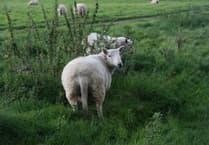An investigation into a major pollution incident in a river which caused tens of thousands of fish to die in what a Powys County councillor has called Natural Resources Wales’ ‘darkest hour’, has come to an end
It is estimated that more than 45,000 fish and other river life died in the incident - which took place on July 31 last year - which NRW said had a ‘highly detrimental’ effect on the river which feeds into the river Wye. The figure - based on a NRW fish-kill assessment - is an extrapolation of a sample and not an actual count.
However the Welsh Government sponsored environmental body ended the investigation into the devastating incident as it deemed that there is ‘no realistic prospect of conviction’.
Powys councillor William Powell said that it’s clear that NRW was ‘woefully under-resourced’ to deal with the incident in a ‘timely manner’ and that lesons needed to be learned from the probe. .
The Liberal Democrat told The Brecon & Radnor Express: “It is essential that lessons are learnt from this sorry episode. One key point is around resources and it is clear the NRW was woefully under-resourced to deal with the incident in a timely manner.
“The attention of the whole country has been drawn to the Wye and its tributaries by this environmental disaster. It is imperative that it is not allowed to happen again.”
Talgarth Cllr Powell took to Twitter to voice his frustration at the response by NRW which he described as ‘feeble’.
He said: “It’s the darkest hour in the history of Natural Resources Wales since it came into being on April 1, 2013. Residents, lovers of the Llynfi and the Wye and all fair minded people have waited patiently for justice, only for it to end with this feeble press release.”
Fellow Powys council Emily Durrant described the probe as an ‘utter disgrace’ on Twitter where she called for an independent review into NRW’s actions.
Cllr Durrant said: “An utter disgrace. NRW is not fit for purpose if it can’t even enforce a major point source pollution event like this one. Devastated doesn’t come close.”
Witnesses near the Afon Llynfi, near Pontithel, in 2020 described seeing hundreds of dead fish and crayfish as well as crayfish attempting to escape the polluted water of the river.
NRW said that its investigation team worked ‘tirelessly to investigate and seek to gather evidence’ to establish what happened and to bring those responsible for the polluting the river to justice.
But NRW then said there is ‘no realistic prospect of conviction’ against any company or individual and so no charges will be brought against anybody - however it also added that it would consider re-opening the investigation if new evidence became available.
Ann Weedy, operations manager for NRW in mid Wales said: “Our officers have been appalled by the damage caused to the River Llynfi by this incident and are very disappointed that we have not been able to bring those responsible to justice.
“The River Llynfi is a Site of Special of Scientific Interest in a Special Area of Conservation. The fact that such a significant number of aquatic animals died in the incident shows just how rich the wildlife was in this small tributary river. Thankfully, assessments we carried out earlier this year are showing promising signs of recovery in the river.
“We have exhausted every lead and done everything we can to be able to prove what happened, but with the deepest regret, this investigation has now ended. We will consider reopening the investigation if compelling new evidence comes to light. If anyone has such evidence, we urge them to contact us.
“We were determined to hold the person or people responsible for the pollution to account. We took our time and worked methodically to make sure we left no stone unturned.”




